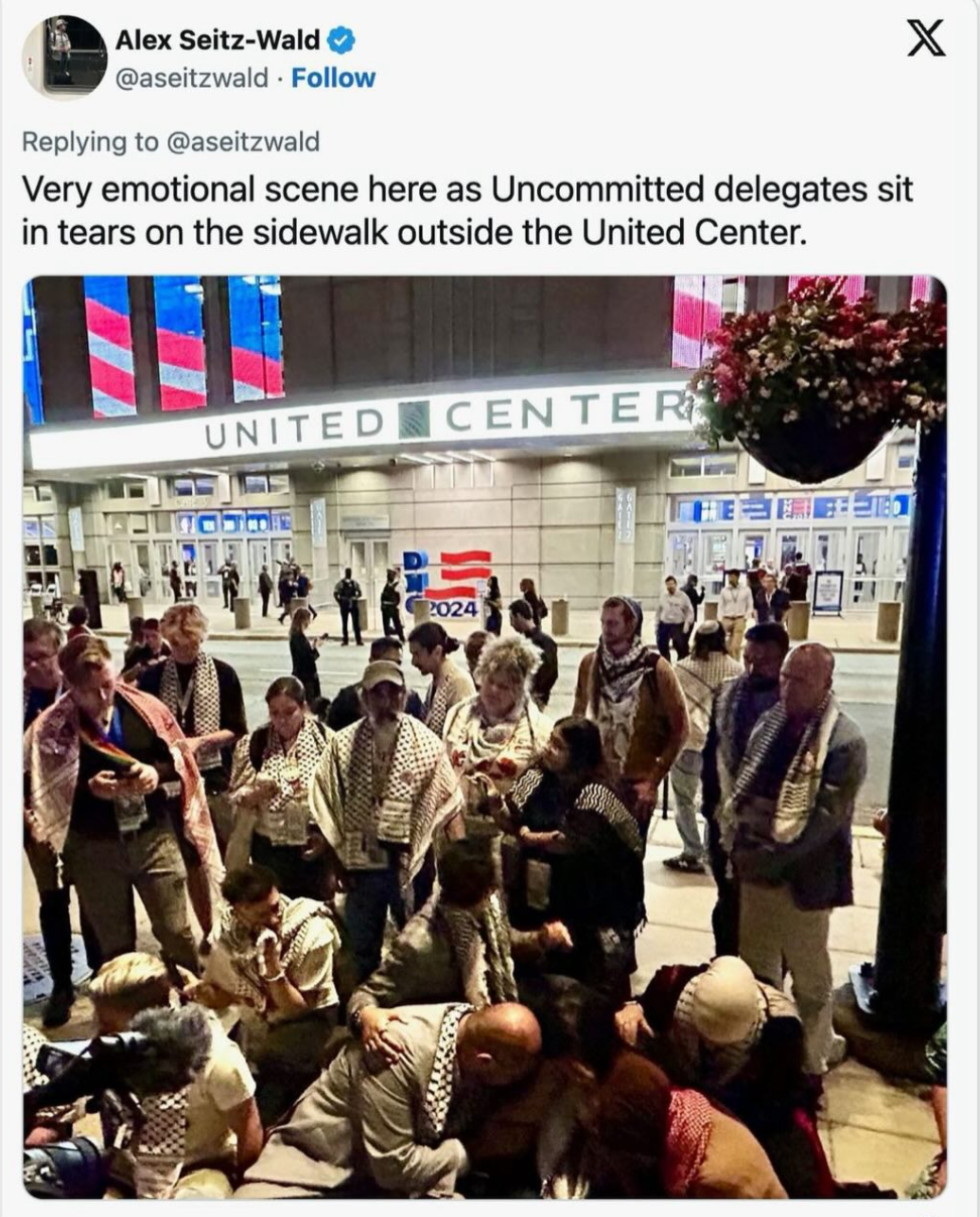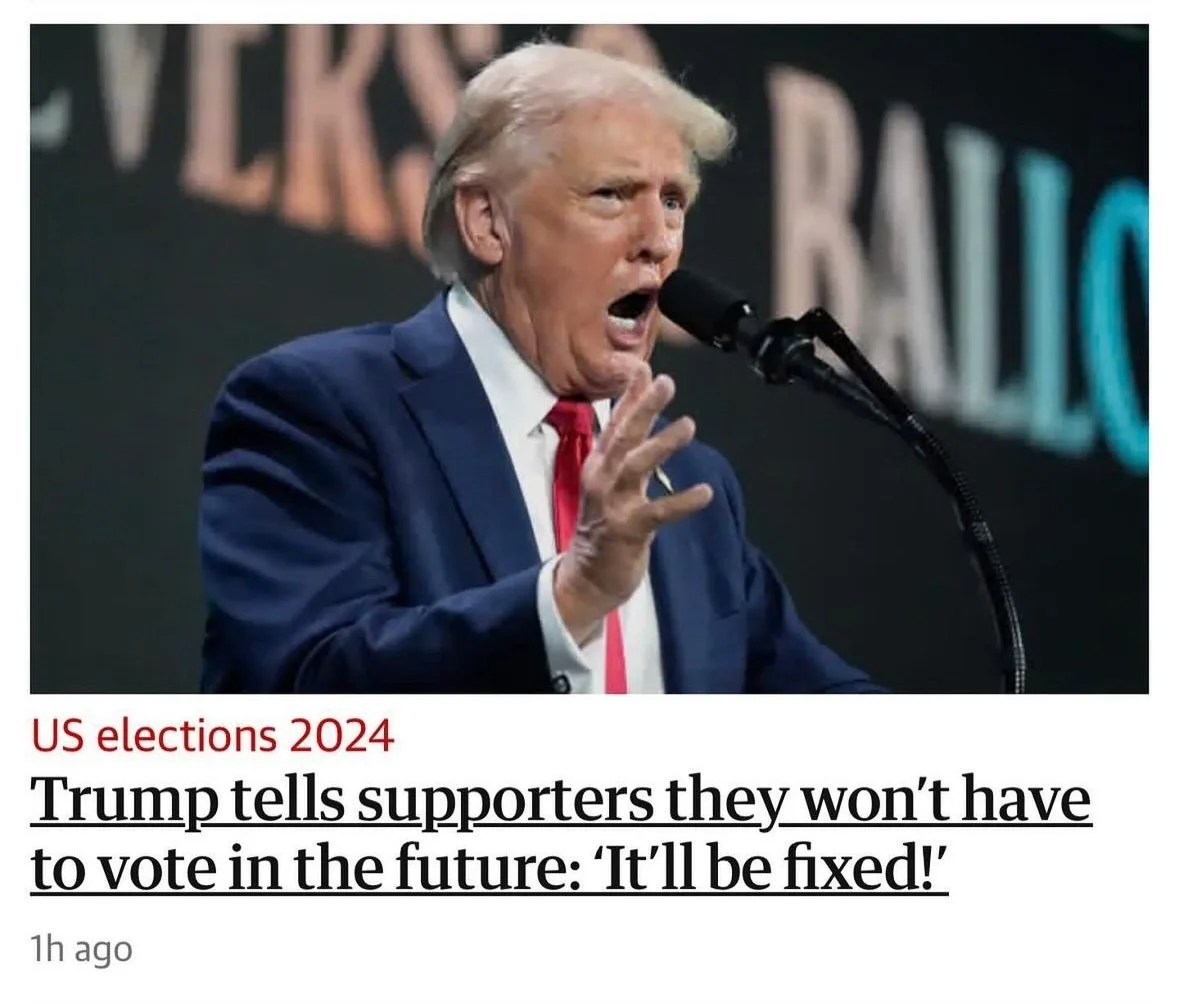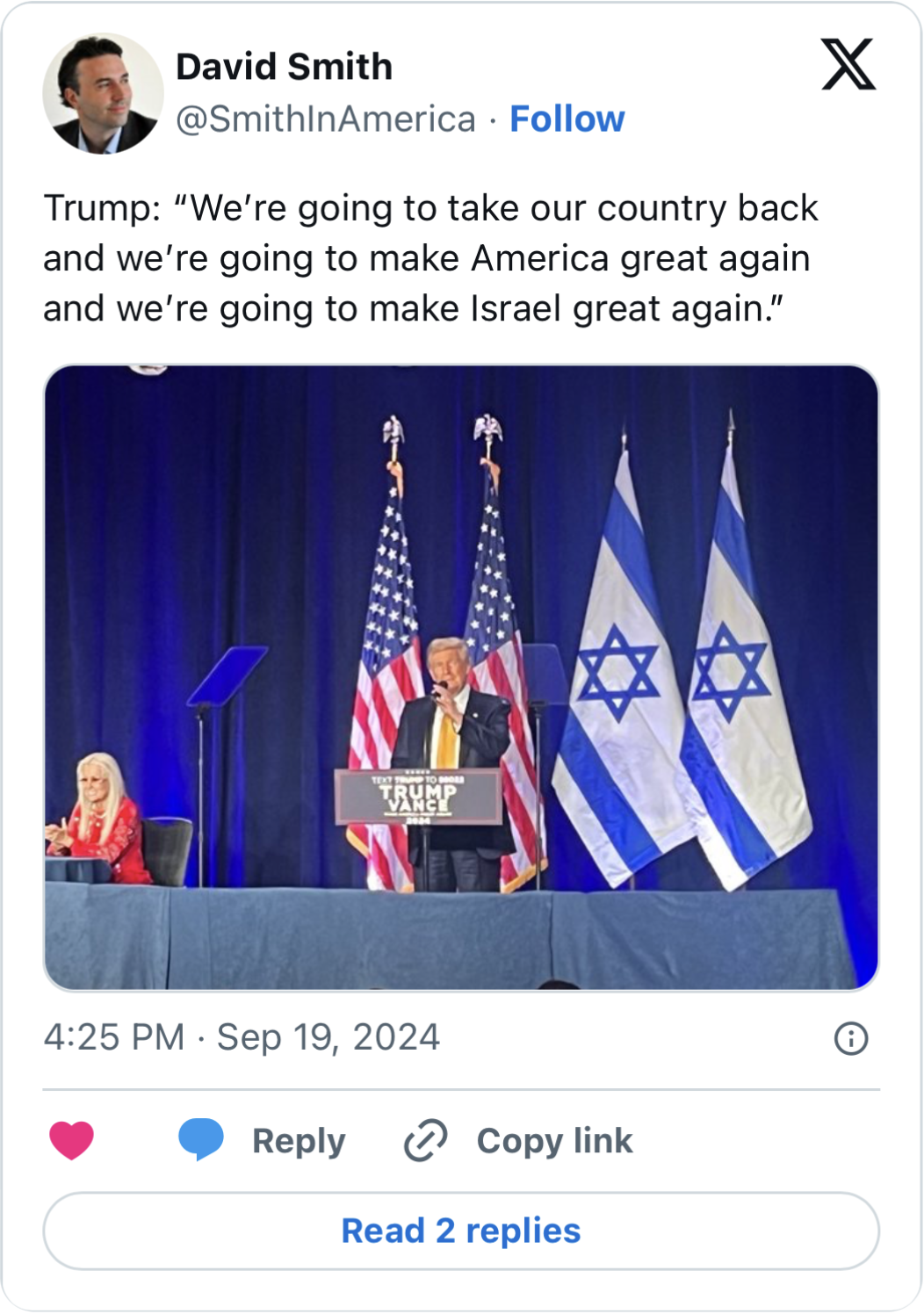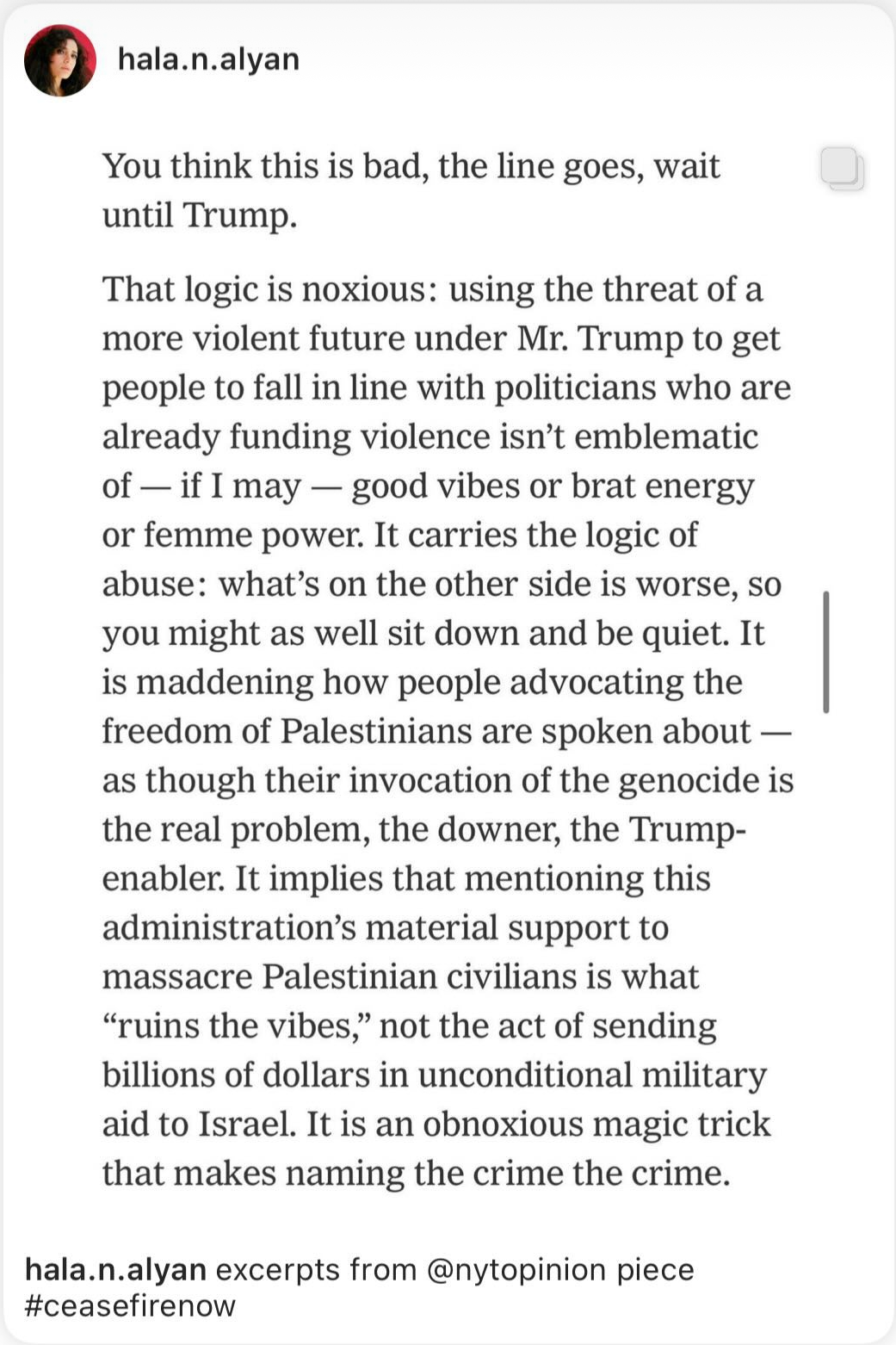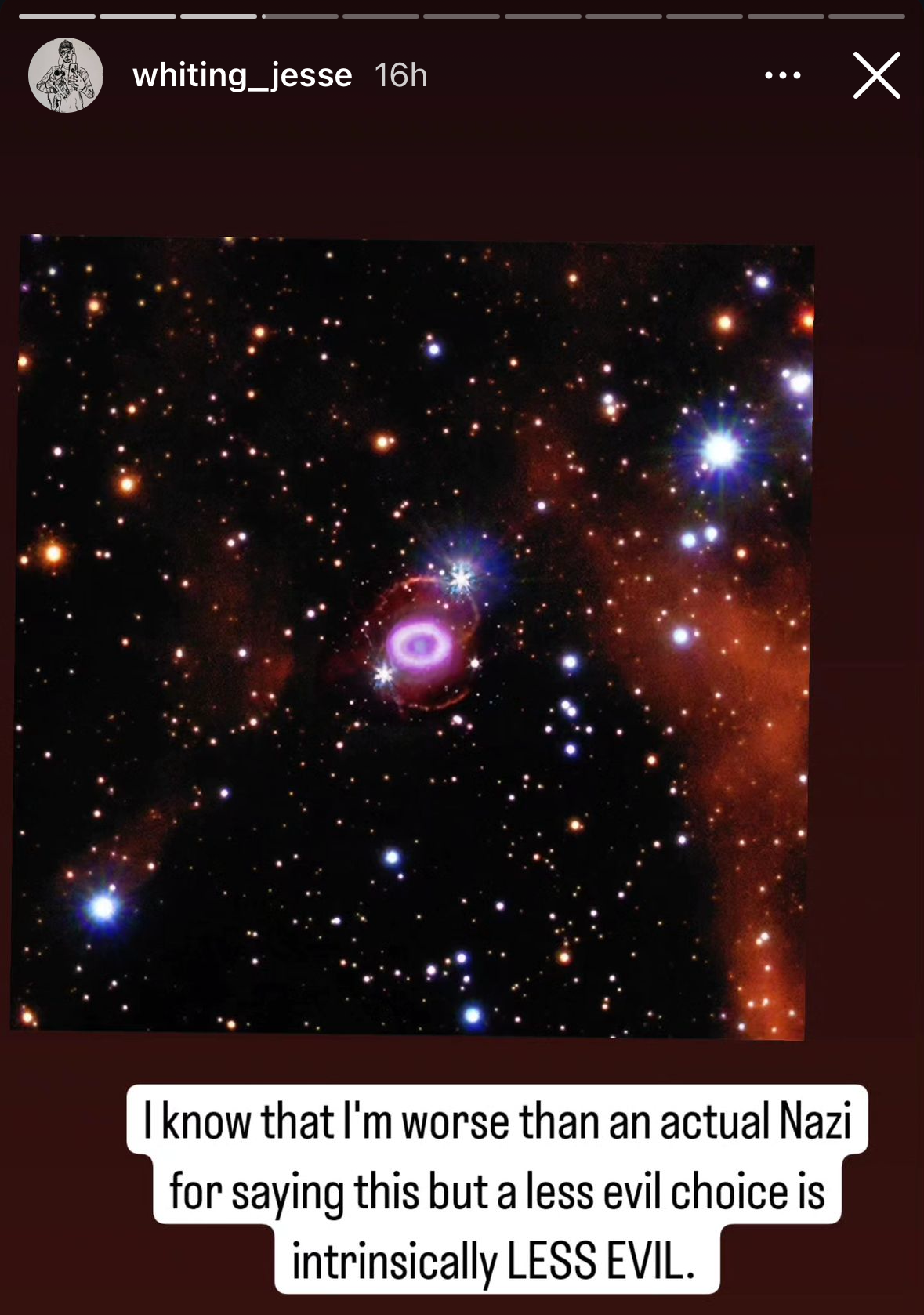Harris is our best option—for Palestine, too (her campaign is going to hate this essay).
My ballot is on the way. And y’all—I’ve been struggling with something: Harris is our best option. She's also our best option for Palestine.
I'd like to share with you how I came to this, and why I've decided I'm voting for Harris.
Democracy has math in it. And I HATE math.
Voting requires this humane part of ourselves to make decisions guided by our morals, but it also requires us to game out potential futures like a mathematician.
We HATE making uncomfortable decisions. Nothing makes us want to pull out of a situation more than an uncomfortable decision—that queasy mix of mathematics and morals in our hearts.
You’ve definitely heard people encouraging you to vote for the sake of congressional, state, and local offices—offices that can be as critical as the president.
But even when you vote for the president, you’re not just voting for the president. You’re voting for all of Congress and its lawmaking ability. You’re voting for the future Supreme Court. You’re voting for impacts that will be felt all the way down to the state and local levels through the issues that the president makes their mandate—sometimes, for generations. Invisible future harms and horrors, positive norms and moral victories. In a country like the U.S., those invisible futures apply to the whole world.
I remember in 2016 the conversations I had with Bernie Sanders supporters who refused to vote for Hillary Clinton in the general. The reasoning given was the usual—I can’t bring myself to vote for someone I don’t like for a, b, c. And if Trump won as a result of them sitting out? Well, that would send a message to the Democratic party that it wasn’t far left enough. Trump would be a lesson worth learning, they said.
I didn’t want to vote for Clinton based on a lot of her policies. But I did—because I knew it was better than the alternative. The day after the election, I discovered that my dad wrote my name in for president—out of protest because he didn’t like Clinton or Trump. In his mind, he saw an uncomfortable decision. He saw the math. But then he decided that if he ignored the math, he could make the uncomfortable decision vanish.
My dad lives in Pennsylvania.
This is how elections go—they are determined not by support of the candidates, but by those who don’t want to face uncomfortable decisions—those who write-in unqualified names or stay home or don't work with the political will of the moment.
There is one way that we can change the math—by changing the political will.
That means standing up and shouting and organizing and shifting the conversation. So, for those who want Palestine to be in the minds and hearts of voters on election day, we should continue to work on changing the political will.
Here's an equation: changing the political will = dreaming big + action + time.
That work is happening. But political will is not a short game. Thanks to that work, some people in this country are just beginning to learn about Palestine, let alone care about it. Endurance is necessary. And for endurance, reducing harm as much as possible is necessary.
The Palestinian people do not have the privilege of endurance.
That's what makes this feel so awful.
There are so many voters outside of our circles who are not swayed by our pleas for Palestinian lives. We need look no further than the DNC or university campuses for the sobering reality of this struggle. But look deeper—to the boomers (sorry to paint with a broad brush), the co-workers who only watch cable news, the people who make up way more of the electorate than we want to believe. The party sees them as the electorate, and that’s one big reason it isn’t listening to us.
That I can walk into a coffee shop in liberal AF Los Feliz in Los Angeles and not know whether I can talk about the rights of Palestinian and Lebanese people openly without drawing ire from the next table—that should be an indication that we are, sadly, nowhere near the political will required for our election to be a referendum on Palestinian lives—or for it to be an *effective* one.
I mentioned to my therapist the other day my anxiety over writing this post, and she—a very liberal millennial who cares enormously about humanitarian issues—was shocked to hear that people my age and younger have shared with me that they plan to vote for Jill Stein because of her stance on Palestine.
A third-party candidate has never won in a presidential election. The closest anyone ever got was 27% of the vote in 1912—and that candidate was Theodore Roosevelt. Even a former president (1901-09) could not make the math work for him.
That something has never been done is not a reason to condemn it, though. The reason is math and consequence.
Stein's record in elections is as follows:
2002 — Governor, MA — 3.4% — LOST
2004 — State Representative, 9th Middlesex District, MA— 21.3% — LOST
2005 — Town Meeting Member, Lexington, MA — 20.6% — WON (7 seats avail)
2008 — Town Meeting Member, Lexington, MA — 11.7%* — WON (8 seats avail)
2010 — Governor, MA — 1.4% — LOST
2012 — President, USA — 0.36% — LOST
2016 — President, USA — 1.07% — LOST
Beyond the obvious conclusion I can draw here that Stein may be best suited to local politics (although she lost a significant percentile when she ran for re-election of her Town Meeting seat), what can I learn here?
*I determined this percentage myself by looking at the Lexington, MA Public Records Portal.
I'm going to give Stein the advantage. We’ll say the 2024 election works out great for her.
And it may well happen. Stein may get the largest percentage of votes she's ever received in a presidential election this year. If I assume her trend of growth from 2012 to 2016 will extend to 2024, that percentage could be around 3.18% (again, I HATE math, so forgive me if I get the numbers wrong). It's possible she could get a few more percentage points, maybe in the best of scenarios landing her at 3-6%.
But we need to give that estimate some caveats.
The Green Party (of which Stein is the figurehead) is a fierce fighter trapped in an unfair two-party system. The only Green Party members in office are at the local level—school boards, township supervisors. Out of those 500,396 offices in the U.S., the Green Party holds 149. That’s .0003%. In 2004, the Green Party held .0004%—so rather than gain influence, they lost it over 20 years—about .0001%.*
In 2012, Stein was not on the ballot in 14 states. In 2016, it was 6. As of writing this, Stein will not be on the ballot in 15 states.**
2 of these are swing states: Georgia and Nevada.
If I consider this information, the current political will, and Stein's record (ignoring her $ and reach), I can make a conclusion that is pretty concerning:
Stein is not actually running for president, because she knows she cannot win.
*I made these calculations using data from PoliEngine and The Guardian
**Delaware, Georgia, Illinois, Indiana, Iowa, Kansas, Nevada, North Dakota, New York, Ohio, Oklahoma, Rhode Island, South Dakota, Vermont, Wyoming
In order to give Stein a fair shot, I have omitted until now Stein’s lack of experience when it comes to conceiving and enacting legislation. I have omitted her lack of coalition-building. I have omitted the thing that I think we all know deep down—which is that a startling majority of voters think of her as a joke when they are reminded that her name is even on the ballot.* I haven’t even detailed the gargantuan forces she’s up against this cycle.
I can’t speak to Stein’s motivation for running. But while she knows she cannot win, she can utilize the one issue that would break off voters from Harris in order to build more name recognition.
She can use us, our country, and the vulnerable people of Palestine to further her own political future, whether she knows it or not.
*For one of my friends, agreeing to give notes on this essay was how they found out Stein was running.
If I voted for Stein while knowing all of this, what would that mean about my vote?
There’s a difference between action and effective action.
Regardless of Stein's experience and motivations, her theoretical gains this cycle should scare us, because they don't have a neutral effect—they eat into the other results. I'm not telling you something you don't already know:
“…our movement is not recommending a third-party vote in the presidential election, especially as third-party votes in key swing states could help inadvertently deliver a Trump presidency, given our country’s broken electoral college system.”
—Abbas Alawieh, leader and delegate of the Uncommitted Movement
Some people might call voting for Stein "refusing to face facts." That’s a little one-sided for my tastes. There is a lot of "refusing to face facts" in the Democratic Party leadership as they ignore how the carnage in Gaza might affect the electorate.
There is bravery in voting with your conscience even when it goes against the grain. But in this case, if I vote for Stein, I know that my vote will only have a negative effect. It will not do anything to reduce the bloodshed in Palestine (and now, frighteningly, Lebanon) both in the immediate or long-term. If I vote for Stein, I’m not making effective action with the tools I have.
Is that what Palestinians deserve? What effective action could I take instead?
“Right now, it’s a struggle being a Palestinian-American. I don’t want a Trump presidency, but, at the same time, the Democratic Party needs to win our vote.”
—Nada Al-Hanooti, National Deputy Organizing Director, Emgage Action (Sep 9)
“Without a meaningful change, voting for Harris would feel for [Samia Assed] ‘like a jab in the heart,’ she said. At the same time, Assed, a lifelong Democrat and feminist, would like to help block another Donald Trump presidency and remain engaged with the Democrats ‘to hold them liable,’ she said.”
—AP
For the people of Palestine, it begins to seem that there are no good options in this election. And that kind of makes sense, as it reflects how Palestine has been sidelined from the international conversation since… forever.
I did not vote for Biden in the primary—I wrote in “Uncommitted.” I believe the Uncommitted cause made an impact—a small one. The sad truth is that if more primary voters had voted “uncommitted,” this election could be very different.
Dreaming big + action + time.
Here we are—back at math. I made a calculation.
A primary is a nominating election, so my vote wouldn’t determine the president, just the Democratic nominee. Biden was the incumbent, and none of his challengers had significant pull; I already knew he was certain to win the California primary. This upset me. But the difference of harm from my voting for him or voting for someone else in the primary was null. Whatever I voted for could bring no additional damage to the world, but it could make a small positive impact. So I voted with my will and my heart.
The math is not the same in November.
The Uncommitted Movement has declined to endorse Harris.
“Vice-President Harris’s unwillingness to shift on unconditional weapons policy or to even make a clear statement in support of upholding existing US and international human rights law has made it impossible for us to endorse her.”
—Abbas Alawieh, Uncommitted leader and delegate
And yet, Alawieh is voting for Harris.*
6 days after Uncommitted’s announcement, Emgage Action (one of the U.S.’ largest Muslim voter mobilization groups) endorsed Harris.
*Source: Detroit Free Press
We are in a triage tent, bleeding out. There are two options to stop the bleeding—some tattered, torn-up gauze, or a barrel of bone-melting hydrochloric acid. But we also remember there’s a medical supply store with brand new, state-of-the-art gauze five miles away. We’ll bleed out before we get there. What do we do?
There is only one solution where we survive. We ignore the acid, we wrap ourselves in the torn-up gauze, and we bleed a little bit on the way to the store—but once we get there, we grab the new gauze and re-apply.
We live to fight another day.
For Palestinian and Lebanese people, this is not a hypothetical—and it’s all happening while Israel drops our bombs on them.
It is tempting to look at the triage tent analogy and say that it is a conspiracy meant to keep us from accomplishing real change, they’ll just move the medical supply store five more miles down the road, the parties are the same, etc. There are some strands of truth here based on our correct cynicism that most politicians don’t actually believe in anything, they just like power. But don’t mistake an accurate sentiment for the whole story.
We’re dealing with systems designed more than 200 years ago for a different world. The inability of those systems to adapt has left them vulnerable to co-option by people who have power and want to keep it, including special interests. There is actually a way to change these systems, such as ranked-choice voting, though the political will for that currently does not exist (although, when we look at millennial priorities, there’s a potential future where that shifts).
But we will never get the chance to change these systems if we don’t make it out of the triage tent.
I remember my 12th grade English teacher teaching that “leisure is the foundation of all civilization.”
Basically, we cannot build something if we are constantly in a fight for our lives. We also can’t save lives if we are constantly in a fight for our lives.
One very extreme way of presenting this would be by asking ourselves if we’d still like to be able to vote after this election. Hey! I know that sounds crazy. But you know exactly which candidate I am referring to here.
I wrote the above paragraph in my notes app weeks before this happened:
*Quoting philosopher Josef Pieper.
We have told ourselves time and time again that Trump (and his sycophants) won’t cross X line or break X rule and then he does. In a second Trump administration, there would be virtually no checks or balances on his power as a direct result of the Supreme Court’s recent presidential immunity ruling. Sure, that matters to us in the States, but let’s not forget that the U.S. is a world power.
And in a world power, when we vote for president, we’re not voting for us. We’re not voting for Palestine. We’re voting for the whole world.
“…[as president, his foreign policy] go-tos were always, like, why don’t we just bomb them?”
—Olivia Troye, former Trump White House National Security Official
I’m voting against Trump.
I’m doing it by voting for Harris. That doesn’t mean I support all of Harris' policies. It also doesn’t mean that she’s a great option for Palestine. It means that based on the math and the variables in play, she is the best option for Palestine in this election. But there’s a little more.
By voting against Trump, I'm also voting against Netanyahu.
Netanyahu wants Trump to win.
He really, really, really wants Trump to win.
It's not just because they're basically the same guy. Netanyahu is still holding meetings with Trump. There are reports of calls between them which may be interfering with the situation in Gaza. Trump supports a one-state solution. There is a “settlement” named after him in the West Bank (and some of Trump’s megadonors want the whole West Bank annexed, of course). If Trump wins, Netanyahu gets to do whatever he wants; he gets even MORE weapons. If Harris wins, he'll have to deal with her concerns, with traditional backstops, with image-consciousness—at the very least.
If we allow Trump to win, things get a lot, lot worse for Palestine and the region—and I know that’s hard to even imagine, but all you have to do to understand this is to look at the attendance of Netanyahu’s speech to Congress in July. All the Republicans showed up. Only half of the Democrats did, and the Republican-controlled house used seat fillers to make it appear as if the room was full. Only one congressperson had the bravery to protest while seated, holding a placard that read, “WAR CRIMINAL” (you know who: Rashida Tlaib). The Republicans are firm in their militancy. What makes Democrats “Democrats” is that they’re having a conversation (albeit not very public).
Of course, it shouldn’t be a conversation—it should be action. But who are we more likely to push to action—Trump or Harris?
I understand why some people believe that by not voting for Harris they are standing up for Palestinian lives. But then I listen to not just what Trump says about Israel/Palestine, but what the Republican party says and does. How many more Palestinians would be dead by now if Trump had been re-elected in 2020 and was president on Oct 7? Or if Republicans had a majority in Congress?
“Harris is not a fascist, and the other person running for president is… [There’s] no question about who progressive people should vote for.”
—Angela Davis
But that doesn’t mean this is untrue:
This is long, complex, tangled work that doesn’t go in a straight line. Our feelings want it to be simple. Places like Instagram capitalize on that.
In a similar way, we want to like the people we vote for. To believe in them and trust them. I think this is the illusion that it all comes down to. It’s not whether we like our elected leaders or not.
It’s whether we can stand them.
Remember the feeling you had when Biden won in 2020? The dance parties on the street? Yeah, IDK about you but that had nothing to do with Biden for me. It had to do with getting rid of Trump. The anxiety and horror he caused for so many. Don’t forget that feeling. Don’t forgot what we won back.
Biden was no solution. Neither is Harris. Looking to our politicians to be solutions—that is a fallacy.
And yet—we don’t have the whole story on Harris. I don't want to underline this too much, since it's mostly conjecture, but it's worth mentioning that the Harris administration will probably have a slightly different approach to Israel than the Biden administration.
Many have been quick to assume that Harris is just an extension of Biden, something the Trump campaign has tried to push since the moment of the big switcheroo.
But if we need a reminder that a VP is not their president's administration, we should just watch HBO’s Veep (only half joking).
The president sets the policy. The VP is virtually powerless, assigned to handle certain issues for the president. Biden set the weapons policy with Israel for his term. Harris had nothing to do with his approach, and in some exchanges, she has shown that she may be more open (and perhaps, more politically savvy). Harris is inheriting an age-old policy that she could shift, we just don’t know.
Now, to be clear, she has had many opportunities to stand up for what's right and bring everyone together on this—and she has not done so. My vote does not excuse Harris' behavior on this issue. Literal lives might be saved if she approached things a different way.
When we voted for Biden in 2020, none of us envisioned the Oct 7 massacre of Israelis and the tens of thousands of Palestinians (possibly more?) massacred in response. This is an ugly, difficult, horrifying thing to face: that the person we vote for may play a role in horrors beyond our imagination. But this is not a new thing, nor is it a “both parties are the same” thing. It is a result of the math we do in every. Single. Election.
Uncomfortable decisions.
So when I ask the horrible question:
Whom would I rather have as the U.S. president during this time of horror for human life in the Middle East—
No one wants to make a decision that feels gross. Uncomfortable. But if I remove my emotions and anxieties and anger from it, if I do the math, there’s an answer. An answer where less people die. Less people hurt. And not just in Palestine. Across the world—and here, in the U.S. It’s abhorrent that our country or its enabled allies would kill anyone in the first place—that we could vote for anyone who would be okay with allowing that. But short of the U.S. party and electoral system miraculously untangling itself into a 100% fair system unlike the world has ever known before November—if we want a world with less pain in it, we don’t have any other option but to face the uncomfortable.
Some people are understandably upset that what this approach amounts to is “harm reduction” for an ongoing ethnic cleansing. People—again, understandably!—do not like hearing that.
But the “harm reduction” approach was made for situations like these—the thorny, horrifying ones that keep us up at night, the ones we scream to stop but it feels like no one is listening. Harm reduction here is an emergency lever we hope we never have to pull. It’s for when we must do whatever we can to stop the bleeding.
When things feel uncomfortable, that's not when we turn away—that's when we have a duty to be effective.
As Angela Davis says, we don’t need to be joyful about our vote—only strategic.
I know we feel like every year we are forced to pick a lesser of two evils. But here’s the truth in that: that’s just… elections—in an era when one party is descending into autocratic chaos. We have an unhealthy democracy—the electoral college is broken, yadda yadda yadda.
The lives of innocent people all over the globe are tied up in what we do with it.
But here’s what I’ve learned:
There is nothing wrong with pushing an elected official to be better, especially when they are running for a higher office—even if they are running against the most nightmarish political reality you can imagine. There’s also nothing wrong with voting for an elected official even though they don’t move as far as we want to push them, especially if we are trying to prevent a nightmarish political reality from creating further misery across the world. We can push for a moral imperative AND be pragmatic about how to use our power. Both things are possible.
An election is not an essay question—it’s a math problem.
When I submit my ballot, no one gets to score the “quality” of my vote or read why I voted for someone. They only get to live with the result.
And if I know what that result is going to be based on factors that are totally out of my control (political will, demographics outside my bubble, campaign $$$, a candidate’s lack of base/experience/electoral success) and I choose to ignore it and vote with “my conscience”... I might ask myself whether I'm voting with my conscience at all, since my conscience is doomed to spell even greater doom to the very people it seeks to aid.
But now I need to admit something to you.
I'm terrified.
I know that if Trump wins, my quality of life will plummet overnight. My anxiety will skyrocket (even worse than now), I will fear having panic attacks (which may bring them on), and I won't be able to pull myself away from the news as our country, well... I'm not even sure I can write that sentence right now. I fear losing everything I hold dear. But what right do I have to complain about such pains when they are the current reality of Palestinians? I feel a sickening guilt that I am so scared about my own little world, with myself and the mental health of my friends, and the physical health of their loved ones, and all of the endangered people in our fragile country—up against something as disgusting as what our government currently enables in Gaza.
But it is a fallacy to believe that I cannot be concerned about two things at the same time, just as it is a fallacy to believe that Palestinians cannot hold Israeli and Jewish people's pain, and vice versa. I’m also not so sure that these two concerns—American well-being and Palestinian well-being—are disconnected. People die directly from decisions that our politicians make every day, we just don’t allow ourselves to see the thread that connects them. An autocrat in one part of the world breeds more autocracy and misery across the world. There is a great loss in this conversation if we miss how entangled we are in one another’s circumstance. And if I can see that dark symmetry, wouldn’t it be a moral failure not to take the most effective action and curb its misery?
With hope for Palestine in my head and heart, I’m doing the math (ugh)—and I’m voting against Trump. I’m voting for Harris. I’m voting for less suffering for all.
ARMS EMBARGO NOW.
FREE PALESTINE.
Do the math.

